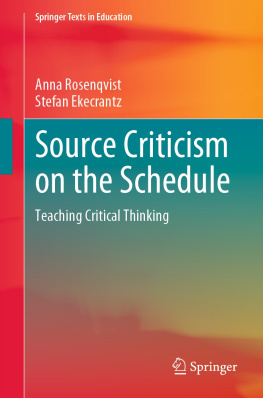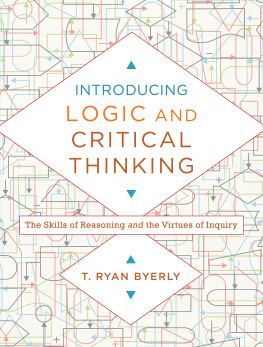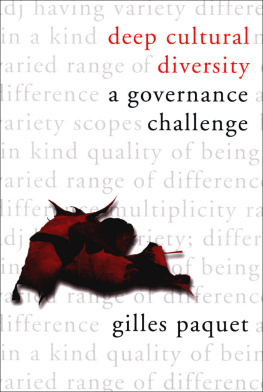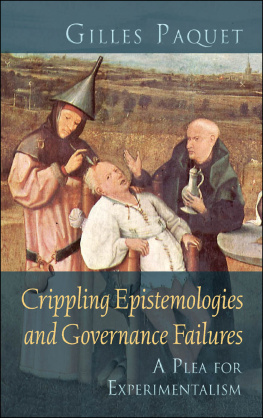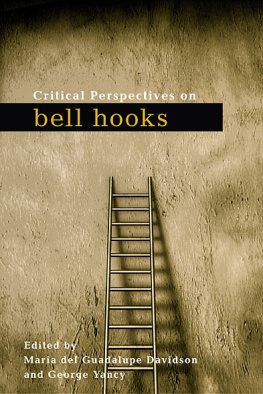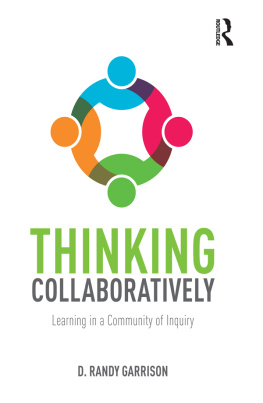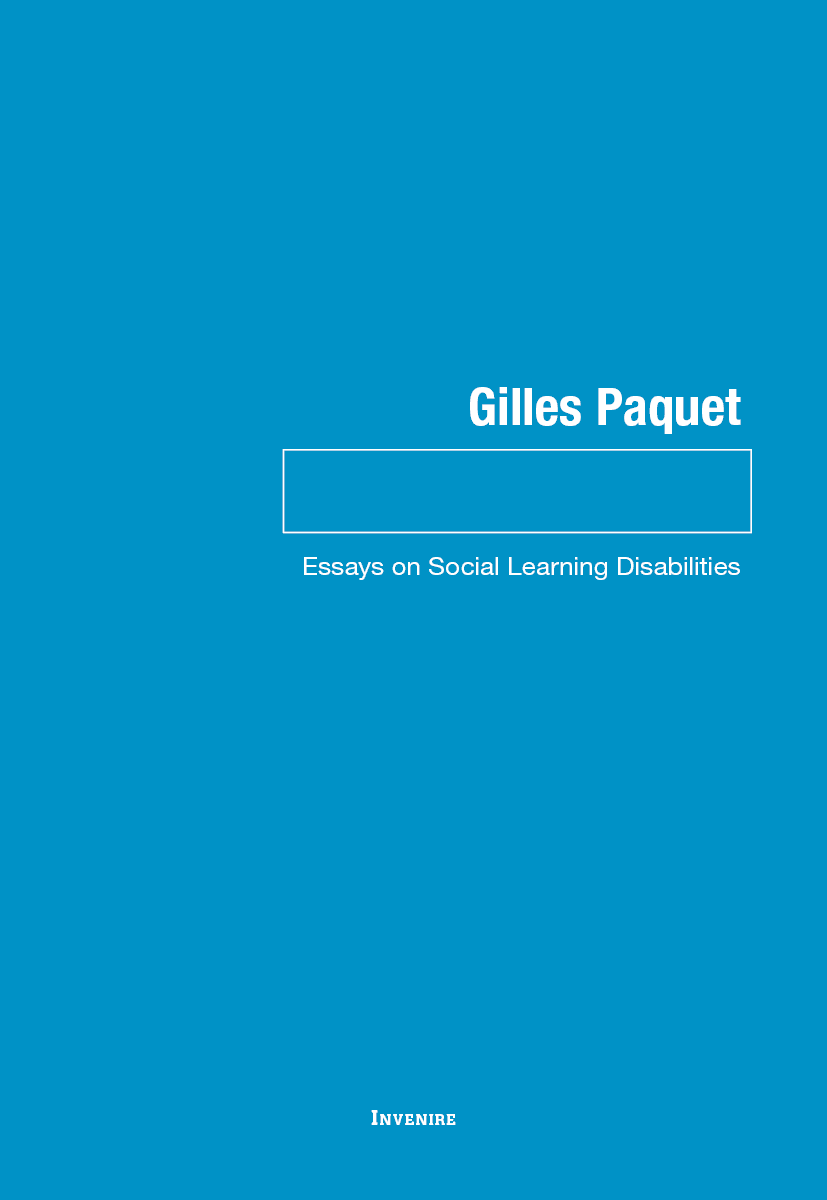Gilles Paquet
Unusual Suspects
Essays on Social Learning Disabilities
| Collaborative Decentred Metagovernance Series
T his series of books is designed to define cumulatively the contours of collaborative decentred metagovernance. At this time, there is still no canonical version of this paradigm: it is en mergence . This series intends to be one of many construction sites to experiment with various dimensions of an effective and practical version of this new approach.
Metagovernance is the art of combining different forms or styles of governance, experimented with in the private, public and social sectors, to ensure effective coordination when power, resources and information are widely distributed, and the governing is of necessity decentred and collaborative.
The series invites conceptual and practical contributions focused on different issue domains, policy fields, causes clbres , functional processes, etc. to the extent that they contribute to sharpening the new apparatus associated with collaborative decentred metagovernance.
In the last few decades, there has been a need felt for a more sophisticated understanding of the governing of the private, public and social sectors: for less compartmentalization among sectors that have much in common; and for new conceptual tools to suggest new relevant questions and new ways to carry out the business of governing, by creatively recombining the tools of governance that have proven successful in all these sectors. These efforts have generated experiments that have been sufficiently rich and wide-ranging in the various laboratories to warrant efforts to pull together what we know at this stage.
The seventh book in the series probes some of the important reasons why social learning disabilities plague the Canadian socio-economy and in particular the public sector. It draws attention to the lack of critical thinking, crippled epistemologies, mental prisons, lack of affectio societatis , excessive politeness, political correctness, failure to confront, unreasonable accommodation and intellectual laziness as not unimportant parts of the problem. The depth of the Canadian malaise and potential ways out of this situation are explored.
Interested parties are invited to join the Chautauqua.
Editorial Board
Other titles published by Invenire are listed at the end of this book.
Gilles Paquet
Unusual Suspects
Essays on Social Learning Disabilities
Invenire
Ottawa, Canada
2014
Invenire 2014
Library and Archives Canada Cataloguing in Publication
Paquet, Gilles, 1936-, author
Unusual suspects: essays on social learning disabilities
/ by Gilles Paquet.
Includes bibliographical references and index.
Issued in print and electronic formats.
ISBN 978-1-927465-14-1 (pbk.).--ISBN 978-1-927465-15-8 (html)
1. Public administration--Philosophy. 2. Public
administration--Psychological aspects. 3. Public administration-
Canada. 4. Social learning. I. Title.
JF1351.P279 2014 351.01'1 C2014-903798-8
C2014-903799-6
Invenire would like to gratefully acknowledge the ongoing support for this series by the Centre on Governance, University of Ottawa.
All rights reserved. This book may not be copied or stored in any information retrieval system, in whole or in part, without the written permission of the copyright owner.
Published by Invenire
P.O. Box 87001
Ottawa, Canada K2P 1X0
www.invenire.ca
Cover design by Sandy Lynch
Layout and design by Sandy Lynch
Printed in Canada by Imprimerie Gauvin
Distributed by:
Commoners Publishing
631 Tubman Cr.
Ottawa, Canada K1V 8L6
Tel.: 613-523-2444
Fax: 888-613-0329
sales@commonerspublishing.com
www.commonerspublishing.com
Politeness is a way of not talking. When we are being
polite, we say what we think we should say
Politeness maintains the status quo.
Adam Kahane
| Table of Contents
Introduction On Social Learning Disabilities
Preamble1
A new twist to the entitlement mentality4
Unfinished business: an attack on the
pneumopathological7
The general line of argument9
Acknowledgements10
Part I On Liberating Learning
Chapter 1On Critical Thinking19
Preamble19
Defining critical thinking20
Critical description for critical thinking23
Exorcizing mental prisons to avoid
crippling epistemologies25
Preventing asocial and unethical conduct
and outcomes30
Triangulation I: to undo harms31
Triangulation II: to design new alternatives34
Conclusion37
Chapter 2 On Inquiring
Introduction43
Inquiring into the practice of administration46
Delta knowledge47
Professional practice, transduction and
connoisseurship50
The social practitioner as inquirer and explorer53
Conflicting frames and circumscribed settings56
Delta knowledge and exploration capabilities57
Conclusion59
Part II On Exorcizing Pathologies
Chapter 3 On Quantophrenia
Introduction69
Crippling epistemologies and policy pseudo-sciences70
Words of caution about the quantophrenic cosmology73
The danger of an overly sanitized stylization
of the public policy process75
The seduction of quantophrenia76
The quagmire of performance evaluation77
The crippling potentialities of quantophrenia78
Uniformization in the face of pluralism and change79
Steering effects79
Management Accountability Framework (MAF)
as an innocuous illustration80
The unintended costs of quantophrenia81
The ergonomics of the public policy process:
focus on affordances82
Conclusion85
Chapter 4 On Disloyalty
Introduction91
Loyalty and disloyalty as different nebulas91
Some basic points91
Shades of disloyalty96
Setting and source of our hypothesis98
Is disloyalty increasing?101
Disloyalty as akin to the underground
economy phenomenon104
Analytical framework105
Disloyalty is growing: some conjectures108
Some things to keep in mind108
Mechanisms at work110
In praise of anecdotal evidence113
Four clarifying vignettes116
The virtue of dissent117
Whistle-blowing120
Affectio societatis 121
The myth of the state clergy122
Conclusion125
Part III On The Canadian Scene
Chapter 5 On The Canadian Malaise
Introduction133
A sample of sources of concern135
Why such cognitive-dissonance-cum-inertia?138
Culture of entitlement138
The demise of critical thinking140
Cult of atonement141
Political correctness142
Failure to confront142
Unreasonable accommodation143
A perfect quiet cultural capitulation143
What to do?148
Conclusion151
Chapter 6 On Tom Courchene as Savanturier
Introduction157
Canadian economics and a prudent heretic157
Une connaissance charnelle of the Canadian socio-economy 159
Quebec and Ontario160
Community of the Canadas, First Nations
province, and a state of mind162
Auspices, futuribles and the viewpoint from a crane 165
The new frontier for a market populist167
Conclusion169
Conclusion On Synthesis and Reasonableness
Preamble173
Blending of perspectives in a chaotic age176
Synthesis as conduit, and reasonableness
as guidepost178
Four challenges182
Coda185
Sources191
Introduction
| On Social Learning Disabilities
avoir raison nest jamais une satisfaction


